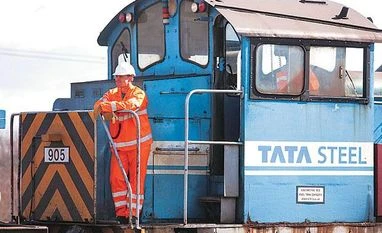'Tata Steel to consider investment in UK plant, if govt funding available'
The UK government has already agreed to a 500 million pound package to support the loss-making steel plant which was facing shutdown over high carbon emission. The plant employs around 8,000 people
)
The company has earlier said it will close both blast furnaces in Port Talbot, the UK's largest steelworks, by the end of 2024
Listen to This Article
Tata Steel would consider additional future investments in its Port Talbot plant in the UK, if more government funding was made available, the company's Chief executive T V Narendran said on Wednesday.
The UK government has already agreed to a 500 million pound package to support the loss-making steel plant which was facing shutdown over high carbon emission. The plant employs around 8,000 people.
As part of its restructuring plan backed by the government funding, Tata Steel will replace the blast furnaces at the unit with electric furnaces to use recycled steel in order to reduce carbon emission. However, the installation of low-emission system will lead to a loss of 2,800 jobs as electric furnaces need less manpower.
"The electric arc furnaces need not be the end, it is the beginning," Narendran told the Welsh Affairs Committee of the House of Commons.
Earlier, steel unions had also suggested the UK government to put more money into securing the future of Tata Steel.
Also Read
The company has earlier said it will close both blast furnaces in Port Talbot, the UK's largest steelworks, by the end of 2024.
Narendran told the Committee on Wednesday that "if there is funding available" for greener ways of making steel, Tata would discuss it.
Tata Steel said it is currently losing around 1 million pound a day from its operations in the town, and keeping a blast furnace open on the site and making steel from scratch would lead to a further lose of 600 million pound.
Meanwhile, in his questioning, Stephen Kinnock, Labour MP of Aberavon which covers Port Talbot, accused Tata Steel of bluffing when it persuaded UK ministers to pay 500 million pound towards its future plans.
Kinnock said: "I put it to you that when you threatened the British government, which it sounds like you did, you would close completely.
"I don't actually believe that was the case.
"If that is correct... then it was not a choice between total closure and 8,000 job losses. It was a choice between your plan and the multi-union plan which would have actually saved 2,500 jobs.
(Only the headline and picture of this report may have been reworked by the Business Standard staff; the rest of the content is auto-generated from a syndicated feed.)
More From This Section
Don't miss the most important news and views of the day. Get them on our Telegram channel
First Published: Jan 31 2024 | 11:20 PM IST


